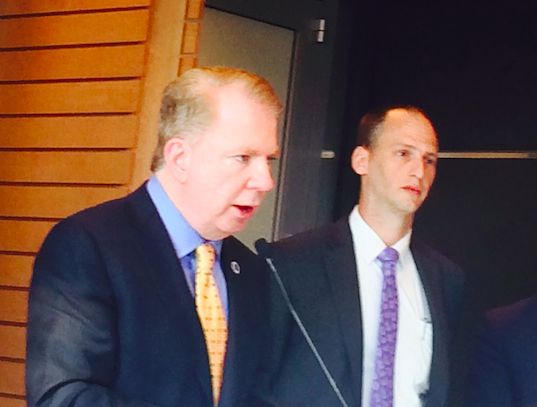Murray Finds Mitigation Money for Beleaguered Central Area Businesses

1. In response to months of complaints from small and minority-owned shops in the Central Area that the Seattle Department of Transportation’s construction project along 23rd Avenue is destroying business, mayor Ed Murray announced yesterday that the city would create a $650,000 “stabilization fund” to help the businesses there.
The mayor had originally told the beleaguered business owners, who eventually and desperately took their plight to the council last week, that the law prohibited direct city aid to private businesses. To get around the restriction, Murray said yesterday the city would tap federal funds; specifically, the city is accessing $400,000 in federal Community Development Block Grants, which are reserved for helping micro-businesses (five employees or less) in low-income areas. The city also identified $250,000 in federal tax credits that can be used to help distressed businesses.
Critics have pointed out that the city gave $15 million to businesses along the waterfront in 2014 to help those (white) businesses survive seawall construction; Murray says the waterfront situation was legally different—he characterized that process as a formal "taking"—because the city literally denied all access to those businesses during construction.

Asked if $650,000 was enough—Murray’s office of economic development estimated between five and 25 businesses might qualify—Murray told me, “I believe this is the right size to mitigate [the impacts from construction]. I don’t believe the fund should be any larger.” Murray acknowledged the one-time fund could set a precedent for other projects around the city. “I don’t believe Starbucks would qualify for the criteria we just laid out,” Murray quipped.
Murray also responded yesterday to the “serious accusation” made by the head of the Seattle NAACP Gerard Hankerson at last week’s 23rd Avenue emergency council briefing, that the SDOT construction was part of an “orchestrated plan…to push black and minority and small business out of Seattle because they don’t want us here.”
Murray said (in a bit of a dare): “Given those allegations, the city will make a new assessment of the project to examine carefully its race and social justice impacts, to ensure the project actually benefits the community. If it does not, we will end it.”
Using the city’s race and social justice initiative “tool kit”—a formal test the city uses to assess policy impacts on poor people and people of color—Murray, who also said yesterday that his preference was to do major infrastructure upgrades in minority neighborhoods rather than “leaving them out,” is essentially setting out to determine “if the project is intrinsically racist.”
In what must have been a first for Murray, he (slyly) credited his predecessor, former mayor Mike McGinn for the project, saying he believed “the prior administration made the right decision” to prioritize a street upgrade on 23rd Avenue.
The issue is coming back before the council today in city council member Lisa Herbold’s economic development committee. (Herbold’s committee not only oversees the mayor’s office of economic development, which has bore the brunt of the criticism and is now administering the federal rescue money, but it includes two important council members on this issue: Mike O’Brien, whose transportation committee watchdogs SDOT, and Kshama Sawant, who represents 23rd Avenue in the new district system.)
O’Brien and Sawant (in maybe a “first” of her own) praised mayor Murray yesterday, applauding the stabilization fund in an official Murray official press release.
For her part, Herbold, found Murray’s all-or-nothing threat to pull the plug on the project a little extreme. “The mayor is the first person I’ve heard suggesting that a race and social justice initiative analysis might be used to end the project. To my knowledge, no one from the community has asked that the project be ended.”
Herbold added: "The idea of an RSJI analsysis is that it is done on the front end."
2. One uncomfortable question that has yet to come up in public during SDOT's two recent appearances before the city council's transportation committee (where SDOT has made its pitch for $1.4 million to buy the fledgling local bike share nonprofit, Pronto) is this: Does SDOT director Scott Kubly have a conflict of interest in the potential deal?
Kubly used to work for Alta Bicycle, now Motivate, the bike share operator that runs Pronto's program. And Motivate is likely to bid on SDOT's bike share contract if the city buys Pronto. The question rose to the top for me when it came to light that SDOT had already written two checks to Pronto for a total of $305,000 (without the council's knowledge) so Pronto could pay Motivate in December, January, and February.
Alta won successive bike share contracts in D.C. and Chicago when Kubly was a department of transportation staffer in both cities, overseeing both programs respectively. He was also part of the city's contractor selection committee in Chicago when Chicago picked Alta. (One of the losing companies filed an official protest alleging impropriety because of Kubly's history in D.C. working with Alta; two reviews, one by Chicago's mayor's office, and one by an independent investigation, ruled that the complaint had no merit.) Subsequently, when Kubly left Chicago DOT in 2014, he went to work for Alta as their director between January and June of 2014, before coming to Seattle. During his stint running Alta, the company set things up, he reports, so that he was barred from doing work on the Chicago contract.
Pronto chose Alta (now Motivate) as its contractor prior to Kubly getting the gig in Seattle. Kubly reports that he has no financial ties to Motivate and didn't make any money when Motivate bought out Alta. "It wasn't any secret that Alta was on my Linkedin profile and my resume" when he applied for the SDOT job, Kubly says.
The mayor's office tells me that the city law department vetted Kubly's past relationship with Alta and found no ethical problems.
Kubly tells me the only person he's close to socially at Motivate is the general manager of the Chicago program, and says candidly: "I wouldn't do that," when I asked if Motivate could take advantage of their connection to him.
In regards to the $305,000 that SDOT paid Motivate, spokesman Rick Sheridan says:
SDOT Director Kubly does not have any sort of financial relationship with Motivate. Like any vendor, Motivate was paid for a provided service. The payments allowed bike share operations to continue uninterrupted for Pronto’s customers.
3. Don't miss yesterday's editorial on the Scalia nomination controversy by U.S. representative Derek Kilmer (D-6, WA). It just got even more relevant today with the news that the GOP has decided they will not hold any hearings on an Obama appointee.




